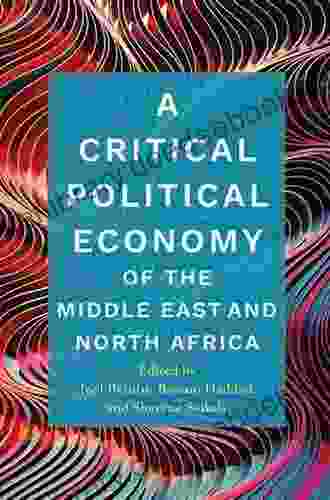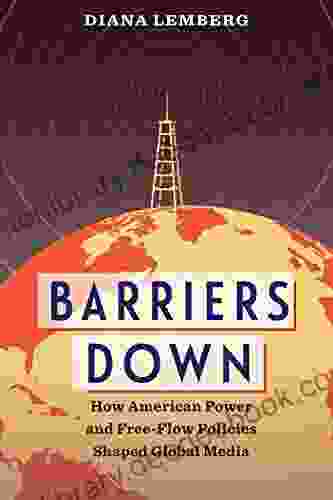How American Power and Free Flow Policies Shaped Global Media

Media plays a pivotal role in shaping our perceptions of the world and influencing our understanding of current events. It is a powerful tool that can be used to inform, educate, and entertain. However, media is also a powerful tool that can be used to manipulate, control, and deceive.
The United States has been a major player in the development of global media. American companies have dominated the global media landscape for decades, and American policies have played a major role in shaping the flow of information around the world.
In this article, we will explore the complex interplay between American power and the global media. We will examine how American foreign policy and corporate interests have influenced the dissemination of information and shaped the flow of ideas worldwide.
5 out of 5
| Language | : | English |
| File size | : | 7892 KB |
| Text-to-Speech | : | Enabled |
| Screen Reader | : | Supported |
| Enhanced typesetting | : | Enabled |
| X-Ray | : | Enabled |
| Word Wise | : | Enabled |
| Print length | : | 300 pages |
One of the cornerstones of American foreign policy has been the promotion of the free flow of information. The United States has long argued that the free flow of information is essential for democracy and economic development.
American policymakers have promoted the free flow of information through a variety of means, including:
- Trade agreements: The United States has used trade agreements to pressure other countries to adopt policies that promote the free flow of information. For example, the North American Free Trade Agreement (NAFTA) includes provisions that require the parties to the agreement to protect freedom of expression.
- Foreign aid: The United States has used foreign aid to support media development projects in other countries. For example, the United States Agency for International Development (USAID) has funded projects to train journalists and support independent media outlets.
- Diplomatic pressure: The United States has used diplomatic pressure to persuade other countries to adopt policies that promote the free flow of information. For example, the United States has criticized China for its restrictions on internet access and freedom of expression.
While the United States has long promoted the free flow of information, it has also been accused of practicing media imperialism. Media imperialism is the process by which one country's media system dominates another country's media system.
American media companies have a dominant position in the global media market. They control a large share of the world's media outlets, including television networks, newspapers, and magazines. American media content is also widely distributed around the world, thanks to the internet and satellite television.
This dominance has given American media companies a powerful influence over the flow of information in other countries. American media companies can shape the way that people in other countries view the world, and they can promote American values and interests.
Critics of media imperialism argue that it can lead to the homogenization of global culture. They argue that American media content can displace local content and erode cultural diversity. They also argue that American media companies can use their dominance to promote their own political and economic interests.
In addition to media imperialism, the United States has also been accused of practicing cultural hegemony. Cultural hegemony is the process by which one country's culture dominates another country's culture.
American culture has a dominant position in the global cultural market. American movies, television shows, and music are widely consumed around the world. American cultural values and norms are also widely promoted through the media.
This dominance has given American culture a powerful influence over the way that people in other countries think about the world. American culture can shape people's values, beliefs, and aspirations. It can also lead to the erosion of local cultures.
Critics of cultural hegemony argue that it can lead to the homogenization of global culture. They argue that American culture can displace local cultures and erode cultural diversity. They also argue that American culture can be used to promote American values and interests.
The internet has revolutionized the way that information is disseminated around the world. It has made it possible for people to access information from anywhere in the world, and it has given rise to new forms of media, such as social media and online journalism.
The internet has also led to the globalization of media. Media companies are increasingly operating on a global scale, and they are able to reach audiences all over the world. This has had a profound impact on the way that people consume media and on the way that information is disseminated.
The internet has also created new challenges for media regulation. Traditional media regulation is based on national boundaries, but the internet has made it possible for media companies to operate across borders. This has made it difficult for governments to regulate media content and to protect consumers from harmful content.
The United States has been a major player in the development of global media. American policies and corporate interests have played a major role in shaping the flow of information around the world.
American power has given American media companies a dominant position in the global media market. This dominance has allowed American media companies to shape the way that people in other countries view the world and to promote American values and interests.
However, American power has also been used to suppress dissent and to control the flow of information. The United States has used trade agreements, foreign aid, and diplomatic pressure to promote its own media interests and to limit the free flow of information in other countries.
The internet has revolutionized the way that information is disseminated around the world. It has made it possible for people to access information from anywhere in the world, and it has given rise to new forms of media, such as social media and online journalism.
The internet has also led to the globalization of media. Media companies are increasingly operating on a global scale, and they are able to reach audiences all over the world. This has had a profound impact on the way that people consume media and on the way that information is disseminated.
The internet has also created new challenges for media regulation. Traditional media regulation is based on national boundaries, but the internet has made it possible for media companies to operate across borders. This has made it difficult for governments to regulate media content and to protect consumers from harmful content.
As the global media landscape continues to evolve, it is important to be aware of the complex interplay between American power and the global media. We must be vigilant in protecting the free flow of information and in ensuring that all voices are heard.
5 out of 5
| Language | : | English |
| File size | : | 7892 KB |
| Text-to-Speech | : | Enabled |
| Screen Reader | : | Supported |
| Enhanced typesetting | : | Enabled |
| X-Ray | : | Enabled |
| Word Wise | : | Enabled |
| Print length | : | 300 pages |
Do you want to contribute by writing guest posts on this blog?
Please contact us and send us a resume of previous articles that you have written.
 Novel
Novel Page
Page Chapter
Chapter Story
Story Genre
Genre Reader
Reader E-book
E-book Magazine
Magazine Newspaper
Newspaper Paragraph
Paragraph Sentence
Sentence Bookmark
Bookmark Glossary
Glossary Foreword
Foreword Synopsis
Synopsis Annotation
Annotation Footnote
Footnote Codex
Codex Tome
Tome Library card
Library card Biography
Biography Memoir
Memoir Reference
Reference Encyclopedia
Encyclopedia Librarian
Librarian Card Catalog
Card Catalog Borrowing
Borrowing Stacks
Stacks Study
Study Lending
Lending Academic
Academic Interlibrary
Interlibrary Study Group
Study Group Thesis
Thesis Dissertation
Dissertation Storytelling
Storytelling Awards
Awards Book Club
Book Club Theory
Theory Textbooks
Textbooks Jacques Fomerand
Jacques Fomerand Matthew Gilbert
Matthew Gilbert Mike Duran
Mike Duran Joanna Osborne
Joanna Osborne Jenna Arnold
Jenna Arnold Mystery
Mystery Michael K Miller
Michael K Miller A M N Goldman
A M N Goldman Crystal Lewis
Crystal Lewis John Russell Rickford
John Russell Rickford Nilanjan Dey
Nilanjan Dey Isabel L Beck
Isabel L Beck Alan Householder
Alan Householder Dan Joseph
Dan Joseph Eve Silver
Eve Silver Ak Khurana
Ak Khurana Mark Gimenez
Mark Gimenez Steve Chapman
Steve Chapman Marty Fort
Marty Fort Gerald L Coleman
Gerald L Coleman
Light bulbAdvertise smarter! Our strategic ad space ensures maximum exposure. Reserve your spot today!

 Ernesto SabatoThe SU Carburettor High Performance Manual: Speedpro Series - Unlocking the...
Ernesto SabatoThe SU Carburettor High Performance Manual: Speedpro Series - Unlocking the... Sean TurnerFollow ·3.8k
Sean TurnerFollow ·3.8k Joe SimmonsFollow ·5.5k
Joe SimmonsFollow ·5.5k Brenton CoxFollow ·18.1k
Brenton CoxFollow ·18.1k Brennan BlairFollow ·18.2k
Brennan BlairFollow ·18.2k Emilio CoxFollow ·7.8k
Emilio CoxFollow ·7.8k Griffin MitchellFollow ·11.4k
Griffin MitchellFollow ·11.4k Ernest HemingwayFollow ·16.2k
Ernest HemingwayFollow ·16.2k Eddie BellFollow ·13.8k
Eddie BellFollow ·13.8k

 Bo Cox
Bo CoxDiscover the Enchanting Allure of Collingwood, Ontario,...
Nestled amidst the breathtaking landscape of...

 Ralph Ellison
Ralph EllisonThe Street of Clocks Poems: A Poetic Journey Through Time
Welcome to The Street...

 Dwight Blair
Dwight BlairCritical Political Economy of the Middle East and North...
The Middle East and...

 Deion Simmons
Deion SimmonsPerfect Strategies For Painting Amazing Marine Creatures...
Gouache is a...

 Hugh Bell
Hugh BellThe American Republic: Constitution, Tendencies, and...
The American Republic,...
5 out of 5
| Language | : | English |
| File size | : | 7892 KB |
| Text-to-Speech | : | Enabled |
| Screen Reader | : | Supported |
| Enhanced typesetting | : | Enabled |
| X-Ray | : | Enabled |
| Word Wise | : | Enabled |
| Print length | : | 300 pages |











